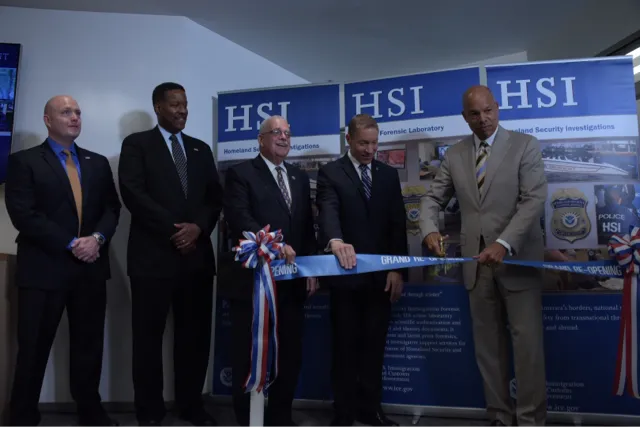For Immediate Release
DHS Press Office
Contact: 202-282-8010

“The men and women who work at this state-of-the art forensic laboratory are performing critical support on a wide variety of criminal investigations -- including document fraud, drug and weapons trafficking, human smuggling, child pornography, cybercrimes and other issues important to national security,” said Johnson. “In Fiscal Year 2015, the lab processed over 35,000 pieces of evidence and its staff provided fraudulent document detection training to over 2,500 personnel from U.S. and foreign law enforcement agencies. The renovation and expansion of this lab will help ensure that our forensic scientists have the right tools to accomplish their mission.”
The three-phase renovation project began in 2012. Key components of the lab include: an extensive reference library of over 300,000 genuine, counterfeit, and altered travel and identity documents and other reference materials; a latent print section in which fingerprints can be developed on weapons, computers, currency and other materials; and a digital media evidence laboratory for enhancing and processing digital media files from surveillance footage, wiretaps and other sources. The lab also expanded by approximately 10,000 square feet to a total size of 40,000 square feet.
The lab was established in 1978 as the “Forensic Document Laboratory” under the former Immigration and Naturalization Service (INS), originally located on Jones Branch Drive in Tysons Corner and moved to its current location in 1988. The laboratory became part of DHS on March 1, 2003, as part of the federal government’s response to the Sept. 11 attacks.
In 2012, the laboratory changed its name to the “Forensic Laboratory” to reflect its growing mission and capabilities, to include latent fingerprint analysis and audio and video enhancement.
The lab is the premier resource for forensic, research, training, and law enforcement issues related to travel and identity documents in the United States. Additionally, it provides advanced forensic, intelligence, and investigative support to HSI, DHS and other U.S. and foreign law enforcement agencies, on a wide variety of criminal cases.
Forensic examiners working at the lab help investigators by providing scientific examination, research, and analysis in support of criminal investigations and other issues important to national security.
Lab personnel also provide training in fraudulent document detection and help in developing identity documents that are more difficult to counterfeit.
The lab has been accredited by the American Society of Crime Laboratory Directors/Laboratory Accreditation Board (ASCLD/LAB) since 2001.
Recent case examples supported by the Forensic Laboratory include:
- 15 Chinese nationals charged in passport, test taking fraud scheme: In 2015, the Forensic Laboratory assisted HSI in a joint investigation with the Department of State that resulted in 15 Chinese nationals being federally indicted in Pittsburgh, Pennsylvania, on charges of conspiracy, counterfeiting foreign passports, mail fraud and wire fraud. In a scheme to have imposters take college and graduate school entrance exams, the conspirators had counterfeit Chinese passports made and sent to the United States. Scientists at the lab evaluated the passports and associated documents and confirmed that they were fraudulent. Additionally, they were able to obtain latent fingerprints which may be used in furtherance of this ongoing investigation.
- Man attempts to send sensitive military technology to Iran: In 2015, a Hartford, Connecticut, man pleaded guilty to attempting to send to Iran extensive documents and electronic data containing highly sensitive, proprietary, trade secret and export controlled material relating to U.S. military jet engines, which he had stolen from multiple U.S. defense contractors where he had previously been employed. A fingerprint specialist from the ICE Forensic Laboratory deployed to Los Angeles in support of the investigation and was able to retrieve latent fingerprints from various boxes used in shipping the sensitive material, which was a key step in proving that the suspect in the case was the individual who attempted to ship the controlled items.
- Former Navy officer guilty of child pornography, sextortion and obstruction of justice: In 2015, a former Navy Top Gun instructor pilot living in Norfolk, Virginia, was found guilty of producing child pornography and sexually extorting his victims. Following his incarceration, a forensic scientist from the ICE Forensic Laboratory was consulted for handwriting analysis. The examiner identified the suspect as the author of a letter addressed to the Chinese Embassy offering to trade his military information for help in breaking out of jail.
- University president sentenced to more than 16 years in prison for visa fraud scheme: In 2014, a HSI Forensic Laboratory document examiner conducted forensic examinations and testified as an expert witness in a case that resulted in the San Francisco, California, founder and former president of Tri-Valley University sentenced to more than 16 years in prison for orchestrating a large-scale student visa fraud scheme that generated nearly $6 million in profits which the defendant used to purchase real estate and luxury vehicles.
###
